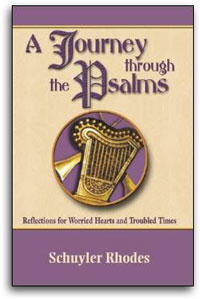Psalm 149
Preaching
A Journey Through the Psalms: Reflections for Worried Hearts and Troubled Times
Preaching the Psalms Cycles A, B, C
Object:
Within the confines of our cultural reality, those who take things into their own hands are showered with praise. Words like, "initiative," and "take charge," describe those who get ahead. But for the faithful of Israel, and thus for those claiming Judeo-Christian roots in this moment, God is the one who is in charge. Not us, not our kings or leaders, but God.
This psalm articulates this awareness as Israel celebrates God's power with rejoicing and with music. The language is beautiful but could be misunderstood as a nod to holy warriors and such. The praise of God is in their throats, and the two-edged sword is indeed held high. But the words and the weapons wait upon God. An old cliché comes to mind that describes the sense of this psalm extremely well. "Work as though everything depends upon you, and pray with the knowledge that everything depends upon God."
It turns out that it's not the aggressive or the initiative-takers who win in the end. It's God's humble and faithful followers who wait upon God's will, rather than their own agenda. The question comes about today's faithful and the willingness to abandon agenda and initiative to wait upon God's will and direction. What would happen if pastors and leaders did that in churches today? The ready answer is that nothing would happen. Things would drift, and the people would be directionless. But is that really true?
For those who depend upon God, hard work can never be abandoned. Striving and struggle are part of God's plan. The important thing, however, is not the doing, but the focus upon doing God's will rather than our own.
Herein lies the day-to-day struggle all people of faith face. Each moment, each action, each word must be accompanied by the perpetual question. Is this about me ... or about God? Is this project about my ego and sense of accomplishment? Or is it about advancing the community, the kingdom of God? Are the words about to be spoken by me, words that build up God's purpose or my own? Call it discernment. Call it prayer. Call it spiritual attentiveness or whatever name can be summoned up, but it is a key process in faithful living.
This is the victory that comes to the humble. This is the glory exalted by the faithful. It is the joy that bubbles forth from the couches and from the pews.
This psalm articulates this awareness as Israel celebrates God's power with rejoicing and with music. The language is beautiful but could be misunderstood as a nod to holy warriors and such. The praise of God is in their throats, and the two-edged sword is indeed held high. But the words and the weapons wait upon God. An old cliché comes to mind that describes the sense of this psalm extremely well. "Work as though everything depends upon you, and pray with the knowledge that everything depends upon God."
It turns out that it's not the aggressive or the initiative-takers who win in the end. It's God's humble and faithful followers who wait upon God's will, rather than their own agenda. The question comes about today's faithful and the willingness to abandon agenda and initiative to wait upon God's will and direction. What would happen if pastors and leaders did that in churches today? The ready answer is that nothing would happen. Things would drift, and the people would be directionless. But is that really true?
For those who depend upon God, hard work can never be abandoned. Striving and struggle are part of God's plan. The important thing, however, is not the doing, but the focus upon doing God's will rather than our own.
Herein lies the day-to-day struggle all people of faith face. Each moment, each action, each word must be accompanied by the perpetual question. Is this about me ... or about God? Is this project about my ego and sense of accomplishment? Or is it about advancing the community, the kingdom of God? Are the words about to be spoken by me, words that build up God's purpose or my own? Call it discernment. Call it prayer. Call it spiritual attentiveness or whatever name can be summoned up, but it is a key process in faithful living.
This is the victory that comes to the humble. This is the glory exalted by the faithful. It is the joy that bubbles forth from the couches and from the pews.


